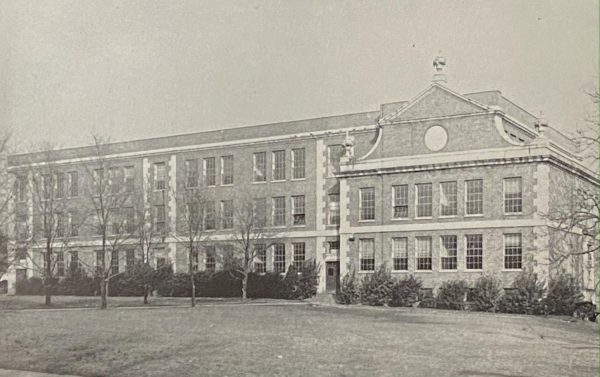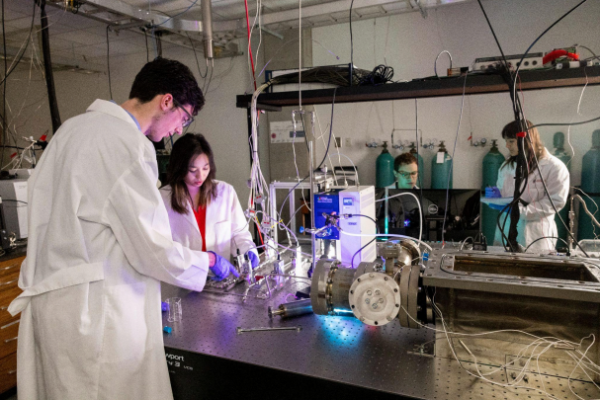Midtown housing prices high, teacher commutes long
School Business Manager Byron Barnes studies the traffic patterns during his commute home from Grady High School.
Wake up to an alarm between 7:00 a.m. and 7:45 a.m. Take a shower, get dressed, eat breakfast, make a lunch, pack a bag, and hustle out the door. Wait at one of many bus stops for those yellow flashing lights or get into a car. Ride or drive to school and hope to make it on time.
“I wake up around 7-7:10 and thats when most of the people I know wake up,” said sophmore Benton Shevlin. There is no way that teachers can wake up before me because they have to get here before me. I only know of one teacher who lives relatively close to Grady.”
This is the morning routine and commute of many Grady students, and not a thought of getting home crosses their minds until the 3:30 p.m. bell rings, when masses of students swarm through the halls to buses or cars.
What students take for granted every morning, and sometimes complain about, is a luxury their teachers cannot afford. With the rising prices of homes in Midtown, teachers’ salaries—with the average APS teacher making $51,000 per year—are no longer making the idea of living in the area a feasible possibility.
Many Grady employees’ days start off a little differently than those of students. Their alarms buzz between 5:30 a.m. and 6:00 a.m., and teachers and staff immediately start checking traffic patterns. Some sit in traffic for the better part of an hour to get to school, and they rush to get out of their classes only to sit in even more traffic to get home.
“I start looking at traffic patterns at 6:00 a.m., and just based on how that is, I can leave a little bit earlier or a little bit later,” said marketing teacher Tony Davis, who lives 24 miles away in Dunwoody and travels 40 minutes to school every morning. “This affects my sleep patterns because I am worried about traffic on (Interstate) 85 in the morning.”
Many teachers go through this daily morning process and a similar one in the afternoon attempting to get home after the school day. Traveling from areas such as Dunwoody and Roswell to the north of Atlanta or Douglasville to the west of the city or other suburbs, traffic is always on their minds. Sometimes, traffic can affect teachers’ ability to do their best job.
“If you get caught in a bad traffic situation, you can come into school a little bit frazzled because you don’t want to be late,” said Byron Barnes, school business manager, who lives 13 miles away. “A bad traffic day in the morning just throws your psyche off.”
Having to sit in traffic for long distances to get to work is difficult for teachers, mainly because they cannot get work done behind the wheel. Atlanta’s limited public transportation does not help the situation.
“I was lucky when I taught in New York that I lived an hour away from where I was teaching,” said AP Seminar and government teacher Susan Salvesen, who lives roughly 6 miles from Grady in Ormewood Park and travels 30 minutes to get to school. “I would just take the subway, and I would read or grade papers and do other work for school on the train. If I had to sit in my car and then go home and do work, I don’t know how motivated I would be.”
There are many reasons teachers commute Monday through Friday from such long distances, sometimes from upwards of 25 miles in bumper-to-bumper traffic. One is the disparity between faculty salaries in APS and Georgia and the rising real estate prices in and around Atlanta.
The state of Georgia ranked 23rd in the U.S. in teacher compensation for 2018, with an average of $53,382 according to. In APS, a teacher can earn between $46,460 for a someone with a Bachelor’s degree and no teaching experience to $91,688 for someone with a Doctorate and a tenure of 27 years. Most teachers fall between $40,000 and $60,000 in annual compensation.
In Atlanta, especially in Midtown close to Grady, townhomes routinely cost upwards of $500,000 and apartments can range from $1,500 to $3,000 a month. These prices are well beyond the average teacher’s affordability range, forcing them to live farther away from where they teach.
“We have been observing the gentrification around Atlanta with new development of $600,000-plus townhomes, so the average teacher, or principal for that matter, isn’t going to be able to afford to live in those,” Barnes said. “Living in or closer to a city definitely is a challenge if you work at an educator’s income.”
For some teachers the only way they are able to live close to Grady is if they bought their house and lived there before the rapid increase in real estate prices, as a result of recent gentrification
“I bought my house in 2004, but with these housing prices, I couldn’t afford to live in town,” Salvesen said. “If I was buying a house now, I would be price ranged out.”
The long commutes also limit teachers’ ability to give extra assistance to students, for instance, after school.
“I will tell you that if I lived closer, I would have after-school tutorials,” said Katherina Cook, ESOL teacher who lives 22 miles away in Roswell and travels upwards of an hour to school. “I would probably coach tennis or volleyball, but because I live far away, I don’t participate in those activities because I have to balance my personal, professional, and social life.”


George is in his fourth year of the journalism pathway and has been a Southerner editor for three years now. Along with spending long hours at late nights,...






